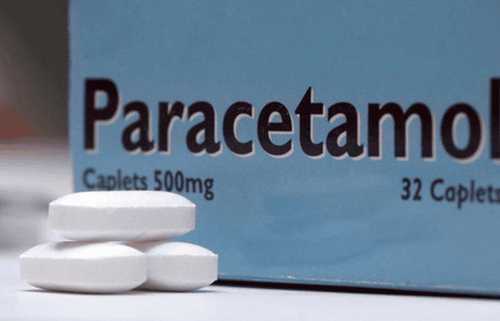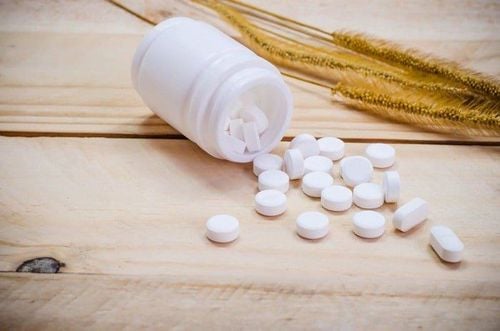This is an automatically translated article.
Buttock pain is a condition in which the gluteal muscles are tense or tight, causing pain, which can be caused by many causes and factors. Buttock muscle pain makes it difficult for patients to sit and affects their ability to walk. The use of some pain relievers can reduce discomfort, but can cause some side effects and should be used with caution.
1. Causes of buttock pain
Buttock muscle pain can be caused by some of the following reasons:
Buttock fasciitis: Buttock muscle inflammation is a condition in which the muscles in the buttock area, especially referring to the external gluteal muscle, is one of the 3 main muscles of the buttock area. feebleness. The cause of buttitis is sitting too much in a chair, exercising but not exercising this muscle group, injury, ... This causes muscle cells not to multiply enough nutrients needed and can't work. normal, causing pain, soreness, and numbness in the buttocks and adjacent muscles. Pain caused by herniated discs in the lumbar spine: This condition can be caused by trauma, long-term disc degeneration causing herniation,... The disease usually manifests as pain from the back, spreading to the buttocks, legs, and possibly Spread to the feet, pain may be accompanied by paresthesias such as numbness, burning, limited movement of the lumbar spine. Pain from muscle tension: Usually occurs in patients with little physical activity, but then the short-term activity, such as strong and intense, causes the muscle fibers to be tense and deprived of oxygen, causing tension pain. Excessive stress: When the body is stressed, tired, it will secrete a hormone that makes muscles tense and increases sensitivity to pain. In addition, when stressed, the operating speed of the circulatory system decreases, so the blood circulation and oxygen exchange for cells in the body decreases, causing muscle pain. Buttock muscle pain will affect the patient's ability to walk and move, sometimes make it difficult for the patient to sit in a chair and interfere with daily work. When buttock pain is affecting your ability to work and the pain is severe, treatment with muscle pain medications may be considered.
2. Measures to treat buttock pain
When you have buttock muscle pain, you can treat this condition with:
Non-medication measures:
Rest, avoid overexerting the gluteal muscles to make the pain worse. Diet: Should eat more vitamins of group B, calcium, potassium, protein needed for the body. For cases of muscle tension pain caused by overtraining, follow the RICE principle of rest - cold compress - compression bandage - elevation of the injured area, usually after about 2 days, the pain will be relieved. Apply a cool compress by using an ice pack and then applying it to the painful area, do not apply ice directly to the muscle. In case of long-term buttock muscle pain, you can conduct a warm compress, use hot heat to help increase circulation and reduce pain. Massaging the buttock muscles: Massaging the painful buttock muscles is a measure to help the muscles relax and help relieve pain. A number of other non-drug methods can be used such as electrotherapy, ultrasound therapy, acupuncture also help reduce pain effectively. Medication measures:
Painkillers: Common pain relievers such as paracetamol can be used; non-steroidal anti-inflammatory pain relievers such as ibuprofen, meloxicam, diclofenac,...; steroid pain relievers; or in some cases of severe pain, opioid analgesics are used, which are narcotic pain relievers. Depending on the level of pain, pain relievers are used from ordinary to combination and if not, the doctor also prescribes a strong pain reliever. Muscle relaxants: When a muscle group is in pain, there is a tendency to spasm. In cases of pain and muscle spasms, muscle relaxants may be needed. These drugs have an effect on the central nervous system, helping to relax the skeletal muscle group. Some drugs can be listed as myonal, mydocalm,... Neuropathic pain relievers: In case the cause of pain is determined to be due to disc herniation or sciatica, the doctor can combine these types of drugs. Drugs that relieve neuropathic pain. Because the nerve that passes through the buttock area is compressed leading to pain in the buttock area, taking these medications will help relieve the pain in the buttock area. Some drugs that can be used are gabapentin, pregabalin,... The above measures are used to improve symptoms. If there is a specific cause, it is necessary to find that cause in order to take measures to treat or prevent the disease.

Các loại thuốc giảm đau thông thường như Paracetamol có thể giúp giảm đau cơ mông.
3. When to take medicine for pain in the buttock muscle?
When treating patients, it is always prioritized to use non-drug measures, then drugs. Some cases of using drugs to treat buttock muscle pain such as:
When non-drug measures are ineffective, the effect is slow or sometimes increases the risk of buttock muscle pain. The patient has a lot of pain, affecting his life, activities and work. In case you have used conventional pain relievers without prescription, but there are no results. It is necessary to consult a doctor and be prescribed by prescription drugs to achieve optimal results. In addition to medication, you still need to combine with measures to change diet, lifestyle and non-drug treatments to improve effectiveness.
4. Measures to prevent buttock pain
In addition to proper treatment, prevention or recurrence of the disease is very necessary. Some preventive measures can be applied such as:
Regularly exercise the gluteal muscle group by getting up and walking around when working, doing regular exercises such as walking, yoga, cycling, swimming, etc. ... No matter what you do to sit continuously, you should regularly get up and walk to limit the risk of buttock muscle inflammation. A thorough warm-up before practicing any sport is a very effective way to prevent muscle pain, especially for beginners. It is recommended to perform a few gentle warm-up movements before exercise to let the muscles get used to the intensity of intense exercise, to avoid inadequate oxygen supply to the muscle causing pain. Stress should be managed as it increases pain levels. Fully supplement foods containing vitamins of group B, calcium, potassium, magnesium, protein, ... in the daily diet. Buttock pain medication is used to temporarily relieve pain, relieve uncomfortable symptoms, but should not be used for a long time because it can cause some side effects that affect many other organs. In addition, pay attention to preventive measures to help limit the recurrence of the disease.
Please follow the website: Vinmec.com regularly to update many other useful information.
Reference articles: hoangmysaigon.com, bacgiang.gov.vn, benhvienthucuc.vn, moh.gov.vn













